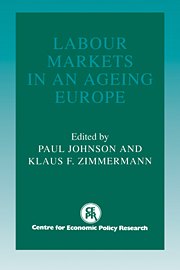Book contents
- Frontmatter
- Contents
- List of figures
- List of tables
- Preface
- List of conference participants
- 1 Ageing and the European labour market: public policy issues
- 2 Ageing and European economic demography
- 3 Ageing and employment trends: a comparative analysis for OECD countries
- 4 Ageing and the labour market in Poland and Eastern Europe
- 5 The implications of cohort size for human capital investment
- 6 Does an ageing labour force call for large adjustments in training or wage policies?
- 7 On ageing and earnings
- 8 Age, wages and education in The Netherlands
- 9 Ageing and unemployment
- 10 Ageing, migration and labour mobility
- Index
10 - Ageing, migration and labour mobility
Published online by Cambridge University Press: 05 November 2011
- Frontmatter
- Contents
- List of figures
- List of tables
- Preface
- List of conference participants
- 1 Ageing and the European labour market: public policy issues
- 2 Ageing and European economic demography
- 3 Ageing and employment trends: a comparative analysis for OECD countries
- 4 Ageing and the labour market in Poland and Eastern Europe
- 5 The implications of cohort size for human capital investment
- 6 Does an ageing labour force call for large adjustments in training or wage policies?
- 7 On ageing and earnings
- 8 Age, wages and education in The Netherlands
- 9 Ageing and unemployment
- 10 Ageing, migration and labour mobility
- Index
Summary
Introduction
The substantial ageing of the European labour force will significantly alter the wage and employment structure. It will then also probably affect labour mobility, and with open borders, also induce immigration. In an equilibrium framework, labour markets tend to equalize real wages and labour productivity. If there are age-dependent productivities, there will be an adjustment of wages as soon as the age-composition of the labour force is altered. Although it has been found that the effect of age is marginal in comparison to other factors and that productivity variations within age groups are more significant than variations across age groups, there seems to be evidence that productivity increases over the work-life as, for instance, would be predicted by human capital theory. (See OECD, 1988, and the literature cited there.) However, the necessary adjustment relies on the flexibility of the labour force and may cause unemployment, at least in the short run.
It was argued that an increase in the age of the active population will reduce labour mobility and increase absenteeism and might adversely affect productivity also via the poorer health of older workers. (More detailed surveys of the arguments are given in OECD, 1988, and United Nations, 1988. See also for the effects on labour mobility Ashenfelter, 1982; Clark and Spengler, 1980.) Efficiency losses in the allocation of labour have to be expected if the aged labour force is less willing to change jobs, industries or regions.
- Type
- Chapter
- Information
- Labour Markets in an Ageing Europe , pp. 255 - 287Publisher: Cambridge University PressPrint publication year: 1993
- 21
- Cited by



